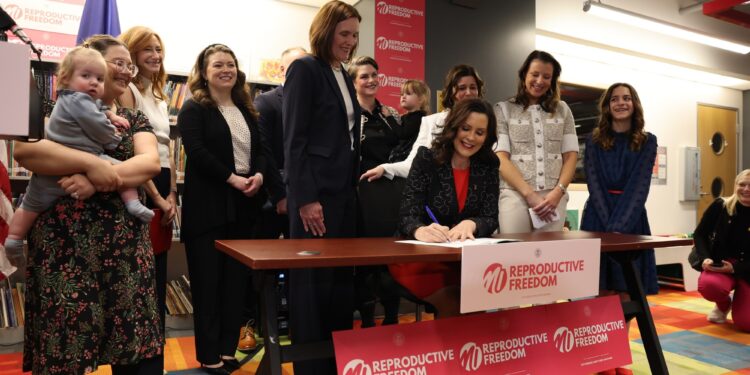LANSING, Mich. (WZMQ) – A new Michigan law aims to support parents and their children born through surrogacy or IVF. The Family Protection Act was signed by Governor Gretchen Whitmer on Monday.
Michigan is the only state in the U.S. to ban compensated surrogacy agreements. The 1988 Surrogate Parenting Act criminalized similar agreements and complicated the parentage of children born from assisted reproduction methods like IVF.
Representative Samantha Steckloff authored the bills which are the latest in reproductive health care laws to be signed by the Governor.
The act would create an easier process for the intended parents of a child to have their names listed on the birth certificate, without which parents have had trouble listing their child on health insurance, and it can also complicate inheritance rights and social security benefits.
Steckloff says she and her co-authors worked to create protections for any circumstance, including LGBTQ+ couples, and those who make the choice for health-related reasons.
Steckloff shared that in 2015 she was diagnosed with a very aggressive form of breast cancer, after which she dealt firsthand with how difficult assistive reproduction methods can be in Michigan. She explained that her cancer diagnosis complicated the adoption process, and when she discovered the ban on surrogacy, she knew she wanted to work to make changes that would help others in her situation.
After running for office in 2020, she said she was able to start work on the bills in 2021, taking nearly three years to see them through to the Governor’s desk.
“Fertility healthcare is part of reproductive rights and includes those who want to start and grow a family but may not be able to do so. it includes those who turn to fertility, technology, and healthcare to begin their families.” Steckloff said. “For so many families who want to grow or start a family. it’s really imperative that we really focus on that child parentage lineage because right now, so many children are not protected.”
Opponents of the legislation worried about the ability to exploit vulnerable women in surrogacy agreements, but Steckloff says it’s not a major issue that has come up in other states.
The ban is still in place and the new law is not set to take effect until 90 days after the end of this year’s legislative session.
The package repeals an unjust ban that made Michigan the only state in the nation to criminalize surrogacy contracts and better protects surrogates, parents, and children so that more Michiganders have the support they need to choose to start a family.
The Michigan Family Protection Act is comprised of nine bills—House Bills 5207 through 5215. together, these bills:
- support parents and their children born through surrogacy or IVF.
- legalize and regulate surrogacy, allowing Michiganders to have children in an environment that protects the children, the parents, and the surrogates.
- align with the best practices by ensuring that individuals who serve as surrogates are fairly compensated, have their own legal representation, and are screened by medical professionals before entering into an agreement.
- ensure children born by surrogacy and assisted reproductive technology (including IVF) are treated equally under the law.
- change outdated state laws to treat LGBTQ+ families equally and eliminate the need for them to go through a costly and invasive process to get documentation confirming their parental status. Even if they move to a state that does not respect these basic rights, these bills help ensure they cannot be denied their relationship to their child.
- make it easier and cheaper for all Michigan families to get formal recognition of their parental relationship to their children.









